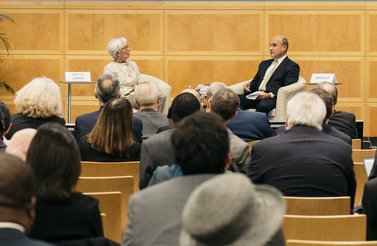On November 7, 2019, CIGI Founder and Chair Jim Balsillie addressed the International Grand Committee on Disinformation and “Fake News” in Dublin, Ireland. The following is a lightly edited version of his testimony.
Read more about new frameworks for governing the world’s most powerful digital platforms in Models for Platform Governance, a new CIGI essay series reflecting on technology’s role in society.
Madame Naughton, committee members,
Thank you for the opportunity to present to you today. Your leadership on issues related to data governance inspires many well beyond your borders.
I am the retired Chairman and co-CEO of Research In Motion, a mobile data services firm that we scaled from an idea to $20 billion in sales. My expertise is the commercialization of technology, specifically for multi-sided platform business model strategies and their network effects.
At the May International Grand Committee meeting in Ottawa, I made six recommendations. Today I will explain the foundational elements that underpin all of my recommendations because a stable, long-term solution to the current challenges lies in confronting them systemically.
The Current Business Model Is the Root Cause of the Problem
Its toxicity is unrelenting. It is not a coding glitch that a legal patch will fix. Data at the micro-personal level gives technology unprecedented power and that’s why data is not the new oil — it’s the new plutonium. It is amazingly powerful, dangerous when it spreads, difficult to clean up and has serious consequences when improperly used.
A business model that makes manipulation profitable is a foundational threat to markets and democracy. Democracy and markets only work when people can make free choices aligned with their interests, yet companies that monetize personal data are incentivized by and profit from undermining personal autonomy.
Whistleblowers inside platform companies told us: “the dynamics of the attention economy are structurally set up to undermine the human will.” That is why we need to outlaw the current business model and re-introduce responsible monetization, such as subscription-based models. Strategic regulations are needed to cut off the head of this snake. Anything less means governments will be perpetually coping with its slithery consequences, turning policymaking into a losing game of regulatory whack-a-mole.
Silicon Valley’s Business Plans Are Not Political Programs
The contemporary technology sector is an industry that celebrates engineering as an alternative form of governance. It distrusts political process and disregards public interest. Its concentration of power is owed to the features of the modern knowledge-based and data-driven economy that tip markets through its steep economies of scale, powerful economies of scope, pervasive information asymmetry and network externalities.
Technology is not governance; it must be governed. The choice we face in 2019 is not between Facebook and China — which paradoxically borrow from each other the tools and tactics that encode their grip on power. The option we face is either a social choice mediated by democracy or social outcomes engineered by unbridled, unethical and unaccountable power.
A Global Digital Stability Board Is Needed
Cyberspace knows no natural border. The Cambridge Analytica scandal involved Canadian technology on an American platform, paid for by Russian and US money to interfere in a British referendum over its future in the European Union.
The business model that enabled this, nourished by discredited neoliberal policies, turns customers into products. If left unaddressed, it will render liberal democracy and free markets obsolete.
The timing is urgent.
In North America, record-setting lobbying expenditures by data-driven platforms resulted in chapter 19 of the United States-Mexico-Canada Agreement, which includes provisions that lock in the current advertising-driven business model and prevent lawmaker oversight of algorithms. The current US administration is working to entrench these rules globally through the WTO negotiations on the trade-related aspects of e-commerce.
We have arrived at a new Bretton Woods moment where new or reformed rules of the road at the international level are needed — rules that preserve an open global trading system, yet, at the same time respect a nation’s sovereign ability to regulate the data-driven economy’s profound cross-cutting economic, security and social effects. I have proposed the creation of an organization that would be akin to the Financial Stability Board that was created in the aftermath of the 2008 financial crisis.
To close, industry can be part of the solution by acknowledging the toxicity of the current business model and migrating to responsible revenue generation for their services.
I submit the following six recommendations for consideration by the committee:
1. Eliminate tax deductibility for personalized online ads: Taxes create powerful incentives. We need to zero in on the core problem: the attention-based advertisement-driven business model. Subscription business models are much less prone to poisonous manipulation, so tax incentives must encourage responsible business models. This approach will weaken the incentive for political leaders to protect social media companies for the purposes of political gain.
2. Ban personalized political advertising: Online platforms continue to master behaviour modification. We are dealing with the largest, most centralized form of attention control in human history. This kind of tool for manipulation should not be for sale to the highest bidder during elections.
3. Implement strict data governance regulations for political parties: We must apply comprehensive privacy regulations to political parties regarding personally identifiable information. Further, we should require transparency of all commercial and technical relationships between political parties and social media companies.
4. Provide effective whistleblower protections: Some of the most valuable information the public has learned about the abuse of data has come from brave whistleblowers. Today’s technology companies are the most secretive businesses in the world with unprecedented and aggressive non-disclosure agreements for their workforce. Make sure whistleblower protection extends to both private sector and governmental activities.
5. Add explicit personal liability alongside corporate responsibility to affect executive and board of director decision-making: We must require annual signed certifications from chief executives and board members, similar to what is required for Sarbanes-Oxley compliance. This 2002 act was designed to better protect investors by improving the accuracy and reliability of corporate disclosures in the wake of various accounting scandals. When a senior executive or board member must affix their name to a document that has personal liability, this immediately changes behaviour to one of greater prudence and caution. Explicit personal liability will also help with tech executives who lie to or deliberately confuse lawmakers.
6. Create a new institution for like-minded nations to address digital cooperation and stability: The data-driven economy’s effects cannot be contained within national borders. New approaches to international coordination and enforcement are critical as policymakers develop new frameworks to preserve competitive markets and democratic systems that evolved over centuries under profoundly different technological conditions. We have arrived at a new Bretton Woods moment. We need new or reformed rules of the road for digitally mediated global commerce — a World Trade Organization 2.0. In the aftermath of the 2008 financial crisis, the Financial Stability Board was created to foster global financial cooperation and stability. A similar global institution, a Digital Stability Board, is needed to deal with the challenges posed by digital transformation.





